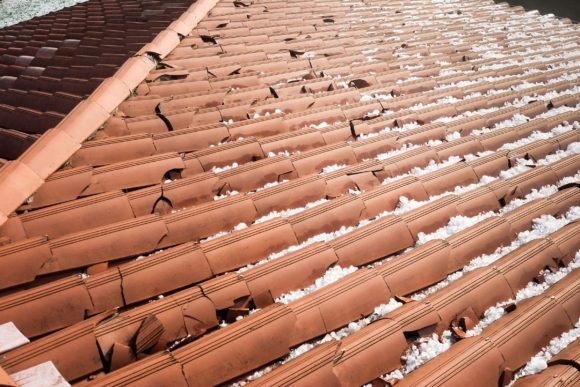The Texas Senate Business and Commerce Committee on March 9 heard testimony on a revised bill that aims to limit the number of policyholder lawsuits filed against property insurance companies following severe weather events.
At the hearing, Senate Business and Commerce Committee Chair Kelly Hancock of North Richland Hills laid out the committee substitute for Senate Bill 10, which he said “makes significant changes” from the original bill in an attempt to “find common ground” among the various stakeholders.
The measure is supported by the property insurance industry, which has seen an increase in post-severe weather event litigation — particularly following hailstorms — in the past several years.
Supporters of the bill say the increase in lawsuits has led to insurers decreasing and even declining to insure homes against hailstorms in the areas with the most lawsuits.
Hancock said that at least a dozen companies have increased homeowners rates as a result of litigation and that “at least seven companies have limited or stopped writing policies in Texas as a direct result of the problem.”
The bill takes aim at the practice of barratry, whereby attorneys incite clients to sue companies, which Hancock has said is the leading cause of the increase in post-natural catastrophe lawsuits.
“Essentially they’re storm-chasers who partner with unethical roofers and public adjusters and recruit homeowners to file unnecessary lawsuits instead of moving through the standard insurance claims process,” he said.
The legislation would bar attorneys from collecting fees in such suits if the insurer can prove the plaintiff was incited to file suit by their attorney. The substitute also adds a paragraph that says if barratry is asserted the trial needs to be bi-furcated. That is, the claim dispute would be tried in one part and the barratry in another before the same jury, Hancock said. That ensures that the claimant’s suit is not delayed or affected by the proceeding against their attorney, he said.
The bill’s opponents say the legislation is simply an attempt to give even more power to insurance companies by limiting policyholders’ ability to hold insurers accountable via the judicial system.
The Texas Tribune has reported that in addition to opposition to the bill by trial lawyers and policyholders, some major business interests in the state oppose the measure, as well.
According to the Texas Tribune, Haynes & Boone lawyer Ernest Martin sent a letter to Texas Lt. Gov. Dan Patrick, who has championed the legislation, that expresses the concerns of businesses “ranging from 7-Eleven to Ryan LLC — founded and led by Republican mega-donor Brint Ryan.” The letter stated that business owners believe the measure would harm businesses by making it more difficult to get their property insurance claims paid in Texas.
But Hancock said opponents’ misgivings have been taken into consideration. “Through the process, what we’re saying in this is that we heard you, we made significant changes, and I will say significant changes,” he said.
Among the changes made in the committee substitute bill, Hancock said, is the removal of the section requiring the litigants to choose between filing suit under Deceptive Trade Practices Act (DTPA) and the Unfair Claims Settlement Practices Act.
“There was much concern over that. That section is gone,” he said.
The substitute bill also clarifies that it pertains only to litigation brought against a property insurer following nature-related events, Hancock said. The substitute also provides that the insurer must be given notice of an intended suit within a legally specified 60-day period after the event.
Another change reduces the amount of penalty interest an insurer would have to pay if the company was found to have unfairly delayed payment of a claim from 18 percent to the prime rate plus 5 percent, according to Hancock.
Both the substitute and the original bill would allow the property insurer to assume the liability for insurance agents in a court action following a weather-related event. The substitute bill clarifies, however, that if the insurer elects to assume such liability the “agent’s absence will not affect the trial of the case.” In other words, the activity and documentation of an agent’s involvement in the case would be available for discovery.
Bryan Blevins, representing the Texas Trial Lawyers Association, testified before the committee that his association continues to have concerns about the bill, despite the changes.
“We recognize the concern about increased lawsuits, we also believe that there are insurer conduct issues that may be responsible in part for the problem.”
He cited Texas Department of Insurance data that shows that insurance companies are taking less time or not doing their due diligence in investigating claims before they close them. Therefore, Blevins said, insurers are having to re-open one out of every three claims they close.
He also said that because the majority of insurers operating in the state are “foreign,” or not headquartered in Texas, most claims disputes will be moved to federal courts and out of local state courts, especially if the insurer takes on the liability of the local agent or adjuster. And “data shows it takes almost twice as long to resolve cases in federal court as it does in state court,” Blevins said.
However, advocating on behalf of the insurance industry, Joe Woods, vice president, state government relations for the Property Casualty Insurers Association of America (PCI), said in a statement that SB 10 will help protect “homeowners from the bad actors who prey on storm victims. The bill helps to stop the lawsuit abuses by storm-chasing lawyers while ensuring that policyholders still have all their legal rights if they feel their insurer acted in bad faith.”
Woods also testified during the March 9 hearing that a company builds its reputation in the insurance market on the strength of its claims handling.
“If a company systematically went out and delayed claims just to build investment income it would soon spread mouth to mouth through the market and they would lose clients,” he said.
The original version of SB 10 is available for review on the Texas Legislature website, but as of March 14 the substitute version had not been posted online.
The bill was left pending in the Business and Commerce Committee.
Topics Lawsuits Texas Carriers Legislation Claims Property Politics Market
Was this article valuable?
Here are more articles you may enjoy.



 Viewpoint: Runoff Specialists Have Evolved Into Key Strategic Partners for Insurers
Viewpoint: Runoff Specialists Have Evolved Into Key Strategic Partners for Insurers  Experian Launches Insurance Marketplace App on ChatGPT
Experian Launches Insurance Marketplace App on ChatGPT  Insurance Broker Stocks Sink as AI App Sparks Disruption Fears
Insurance Broker Stocks Sink as AI App Sparks Disruption Fears  Judge Tosses Buffalo Wild Wings Lawsuit That Has ‘No Meat on Its Bones’
Judge Tosses Buffalo Wild Wings Lawsuit That Has ‘No Meat on Its Bones’ 


